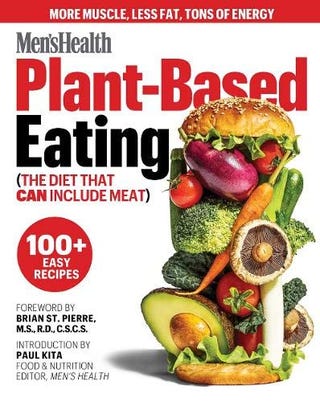
NOWADAYS THERE are too many diets to keep track of (keto, paleo, gluten-free, Atkins), with some more sustainable (think the Mediterranean Diet) and others more fad-like in nature (think the Optavia Diet).
Add the 1,200 Calorie Diet to the (long) list of fad diets.
While the purpose of the diet is self-contained in its name—you’re literally restricting your calories to 1,200 a day—there’s a lot to unpack about the plan if you’re considering it as an approach to weight loss.
The 1,200 Calorie Diet bills itself as being built upon sound nutrition principals (as in, proponents of the diet don’t just pull that number 1,200 out of their hats), and argues that it can lead to drastic weight reduction in record time.
Considering that moderately active men ages 16 to 25 should be consuming 2,800 calories daily, and that moderately active men ages 26 to 45 should eat 2,600 calories daily, that target number of 1,200 is kind of, well, scary.
Is that kind of calorie restriction safe? Will a 1,200-calorie diet actually help you lose weight? And, even if it does, will that weight loss come with any side effects, either to your body or mind?

If you’re considering the 1,200 Calorie Diet (or any highly restrictive diet, for that matter) you’ll want to know how it works, the pros and cons, and how best to do it safely and efficiently—if at all.
And, as a general note, you should always speak to a dietitian before beginning any kind of drastic dietary program.
But here’s what you should know about the 1,200 Calorie Diet now.
What is the 1,200 Calorie Diet?
The 1,200 Calorie Diet is a low-calorie eating plan that limits the total number of calories consumed each day to 1,200. Advocates of a 1,200-calorie diet argue that this particular amount of calories is the “magic number” for calories as it relates to weight loss and can help you shed pounds in 30 days or less.
Here’s the truth: There’s no science behind that number. Some sources cite the American College of Sports Medicine for settling on the number, but there’s currently no information on the organization’s website to suggest this is true.
Consuming 1,200 calories a day may lead you to weight loss, that’s true, but there’s nothing magical about that number.
What do you eat on the 1,200 Calorie Diet?
Not much, that’s for sure.

“To stay within these 1,200 calories, it’s recommended to eat three meals and one snack per day, while being mindful of portion control and mealtimes,” says Ilyse Schapiro, M.S., R.D.
There aren’t really guidelines other than energy restriction, which makes it sound easy. That said, maintaining an energy deficit of that level can not only be difficult and stressful. And there may be negative health consequences of a 1,200-calorie diet depending on how long you try to maintain it.
This is especially for active men, who need to eat double the calories than the 1,200 Calorie Diet, according to current USDA recommendations.
And due to the diet’s lack of structure, it’s hard to really know you’re doing it “properly”—not to mention how to figure out which types of foods you should be eating so that you’re not running the risk of nutrient deficiencies.
Most dieters “will log their food intake into a tracking app to keep up with how much they’ve consumed in a day, with some going the extra step to actually weigh or measure all of their food,” says Kelly Jones, M.S, R.D.
Others may subscribe to meal plans or meal delivery services that are supposed to stick to a specific calorie goal. So there’s flexibility in how you do it. And if your flexibility bends toward eating 1,2oo calories of highly processed junk food, well, at least you’re running a calorie deficit?
With the 1,200 Calorie Diet, that sort of “it’s up to you!” factor may be just one of the dangerous drawback.
What are the side effects of the 1,200 Calorie Diet?
“1,200 calories per day is an awfully low amount of energy for men,” Says Schaprio. “Consuming too few calories can lead to metabolic, hormonal, and reproductive destruction to the body.”

For example, severe calorie restriction can reduce bone density and increase the risk of osteoporosis and hip fractures in men.
What’s more, endocrine hormones, which regulate insulin levels, adipose tissue, and inflammation in the body can become disrupted too, leading to a cardiovascular risks and other health concerns, Schapiro says.
Even further, long-term calorie may alter sex hormones, leading to lower circulating sex hormones and poor reproductive health. Yikes.
Does the 1,200 Calorie Diet work for weight loss?
Yes, probably, but at the greater risk of your long-term health.
Due to substantial caloric restriction, this diet may be effective for men who want to drop pounds fast. However, for sustained weight loss and weight maintenance—and overall physical and mental health—this diet is not the answer.

And if you’re thinking, “Oh, well I’ll just hop on it quick and then hop off,” hold up.
You might gain even more weight after you go off the diet, says Jones, with your body storing additional weight as a protective measure against future severe calorie restriction.
Physiologically, you may not only respond with a reduction in basal metabolic rate but also you may have an increase in hunger hormones, a decrease in satiety hormones, and increased satisfaction when you eat, causing you to want to eat more and more often, says Jones.
The takeaway: While short-term weight loss may happen, the risks of the 1,200 Calorie Diet outweigh any benefit.
Source: Read Full Article